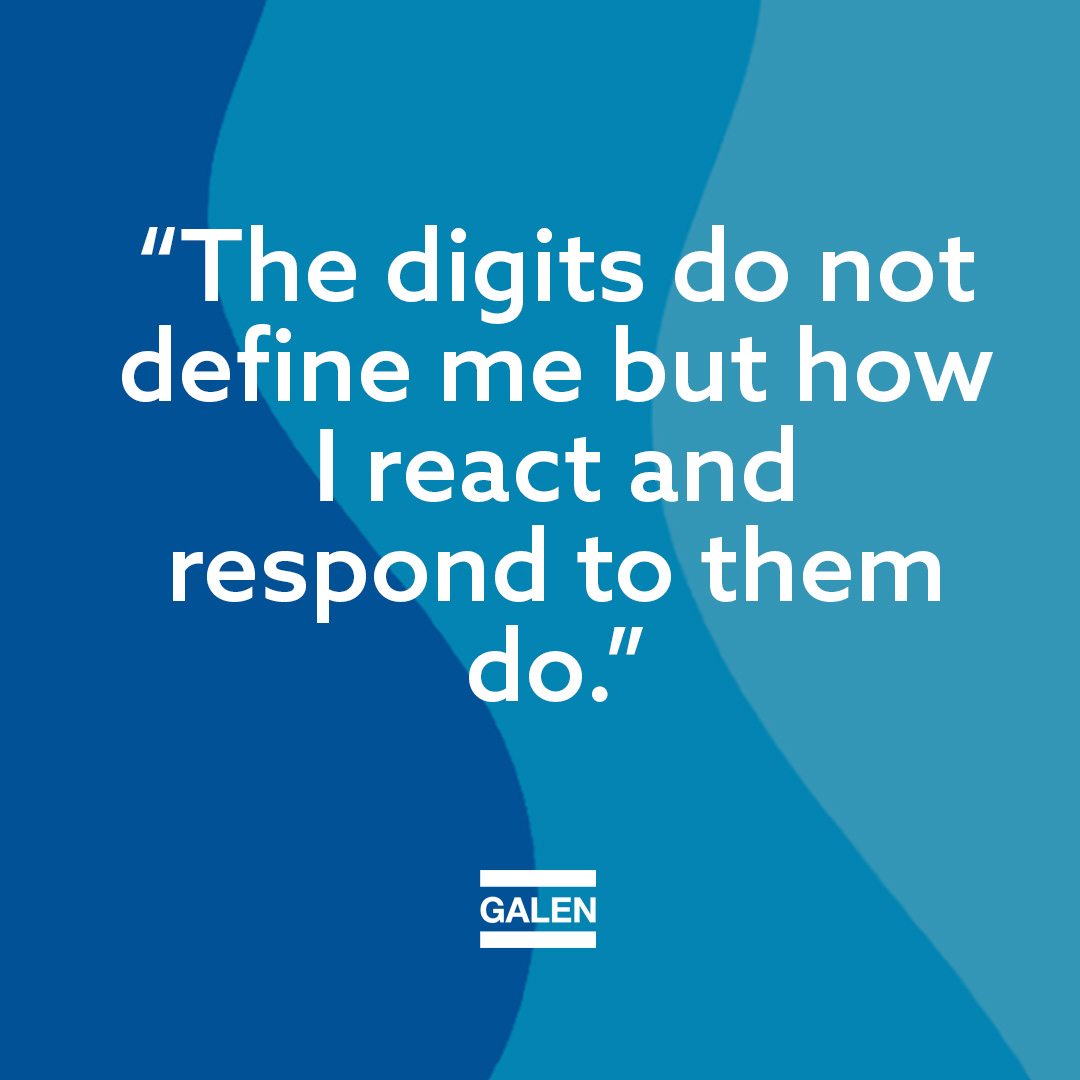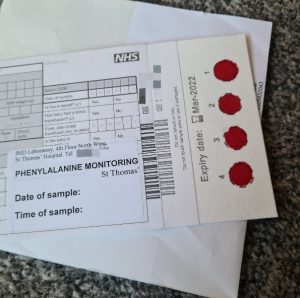The digits do not define me

Hello everyone, my name is Clair Willcocks, I am 28 years old and I am Galen Medical Nutrition’s PKU blogger. I am an adult with PKU and I was diagnosed with Classical PKU 8 days after birth. I am on 5 exchanges of protein a day and currently taking the PKU EASY Microtabs substitute 6 times a day.
I’ve spoken before about PKU blood tests – how frustrating the wait time can be and how it all feels very backwards, compared to other diet related conditions. For example, with diabetes you normally assess your blood levels and then choose what you want to eat, rather than eating and then assessing how you’re doing based on your blood levels afterwards.
But as well as the physical battle of trying to keep on diet to keep my blood levels low, there’s also a different battle going on. There is an emotional battle in my head whenever I receive my blood test results.

The whole month I could be following my diet to the letter; tracking everything that I’m eating, keeping notes of when I’m taking all my substitutes, avoiding take aways etc. So, when I send off my monthly blood spots, only for the results to come back saying they were a lot higher than I was expecting, maybe even over the recommended target, it can be really gutting.
Upsetting to the point where I just want to cry, scream “what’s the point?!” and order myself a big take away to eat all my sorrows away (understanding that this will make my levels even higher, of course.) Unfortunately, I know it’s not just me that has had this experience, it happens to us all. To quote Beauty and the Beast, this is a “tale as old as time” when it comes to PKU.
Before – The Lies
When I was a teenager, around the age of 15-17, I was just trying to get on with life. I was studying for my GCSE’s, going to college, working in a charity shop, maintaining relationships and generally, trying to get on with life. I was wanting to fit in with friends and go on days out or holidays, so I would eat whatever I wanted, regardless of the negative effects.
In college I had lost all routine. I struggled to get the drinks down me and I was struggling with my diet. I had brain fog, I struggled to keep my emotions in check and could see the untaken drinks piling up.
I knew I was losing track; I didn’t need my blood level from the dietitian to know my bloods were high, but I didn’t care. It was the price I paid for a ‘normal’ life. Add these emotions on top of all the teenage hormones running around in your blood stream, telling you ‘it’s you versus the world’, feeling overwhelmed with studies or relationship issues. Getting blood results back just proved what I already knew – that I could not escape from my PKU and what I was doing had consequences. The high digits made me feel like if I was failing at my PKU, and I was also failing at my life.
Not only that, for some reason I strongly suspected my dietitians were judging me. They were asking me why my levels were high and if there is anything they can do? In my head, they knew I wasn’t sticking to my diet and I knew they knew, and were angry with me. I was angry at them for being judgemental, that they couldn’t know what I was going through. I struggled with this diet every day on a basic level, and they saw me just once every 6 months/year. What could they do or how could they possibly understand what it’s like?
Eventually, this mental angst would rise up every single time I did my blood test. I knew, I wasn’t sticking to my diet, and so doing the tests I knew my blood levels were going to come back high which completely put me off doing them at all. It felt like the high result was inevitable no matter what and I didn’t want that email from the dietician calling me out on it. I felt shame, shame I wasn’t doing well on my diet and that the blood results proved this for all to see.
The problem with this was that before I knew it, I would go months without doing any blood tests at all. At my next appointment, the dietitians would ask why there was a delay in blood spots, so my doctors had no idea what my diet was doing. When I went to my check-up they would question it, offer to help and the consultant would ask their usual question of “how are you doing with your diet?”. I couldn’t answer this question honestly, because the answer was I was doing awfully. To be honest even being asked that felt wrong, like how can your everyday life, emotional, mental, and physical struggles with a metabolic condition be summed up in one answer or in a 15-minute doctor’s appointment?
They told 16-year-old me that, “You just need to have your drinks and stick to your diet and your levels will come down.” It was so frustrating to hear this over and over again, like it was just ‘that easy’ to get control of my diet and to take my drinks. I still wasn’t able to, and I didn’t feel I could be honest with my dietitian or doctor because of the fear of shame, so I would just always answer “I’m fine, my diet is fine.”
Teenage me felt that I was doing everything I could to stay on my diet (as much as I wanted to anyway), but I was burying my head in the sand and ignoring my issues. What’s worse is I didn’t know how to ask for help, so I figured what’s the point of trying? I might as well just eat what I want because my levels would be high either way?
Now – The truth
The truth is that my dieticians and doctors didn’t understand what I was going through because I wasn’t talking to them. I wasn’t asking for the help that I needed because I didn’t think they would understand or be able to help. I remember the first time I was finally honest and said “look I’m actually really struggling and I don’t know what to do” and my dietitian & I sat down and went through my diet and what we could do.
The more I’ve opened up with my dietitians, the more help they’ve been able to give me. Whether it was completing a 1-week food diary to see what can be changed, helping me to get me the foods I need with my GP, sending the latest food products for me to try or just having regular check in calls to see how I am. I even asked if I could do more regular blood tests to help get my levels down and they said that would be fine!
It turns out they weren’t judging me over my blood levels and thinking I was ‘failing at life’, they were just keeping an eye on my health! It’s important for me to remember the only contact my dietitian/doctors have with my diet is my blood levels. If they are to spike and continue to be too high, it could mean something is very wrong that needs to be dealt with and there is no judgement behind the phone calls or emails.
Yes, a more regular testing system would be helpful; a home testing system would be even better so we can do on-the-spot testing. Maybe there’s better ways dietitians and doctors can open the floor, so patients can have a more honest conversation. However, in the meantime, it’s important for me to remember that just like the number on a set of weighing scales, it does not represent my body shape, type, or how ‘healthy’ I am. The monthly blood test is just a digit, an average of how I’m doing. it does not represent my whole PKU life.
Just like weight, there can be so many factors to a high or low level, and if the level is consistently high then I need to be working with my dietitian to try and improve it for my own health. The high level may just be a one off but what if it isn’t? What if I’m innocently eating/drinking something I didn’t realise had high protein? What if I’m doing all the wrong kinds of work outs? What if I have an infection and I don’t realise?
I have good months and bad months, just like good days and bad days and like everything, it’s about finding balance in what works for me whilst also maintaining my health. If my levels aren’t great this month, (even when I thought they would be!) it’s not the end of the world. There is always next month to try again! It’s just another part of PKU life that needs to get done to keep myself healthy. The digits do not define my whole life or my whole PKU experience.
If I could go back to my younger self, I would tell them that it’s okay, that yes, this diet is bloody hard! But you’re not alone. There are people that can help as long as you ask for it, so you don’t need to make yourself feel alone. Of course, the doctors can’t understand what it’s like to have a metabolic disorder, but it doesn’t mean they can’t help.

